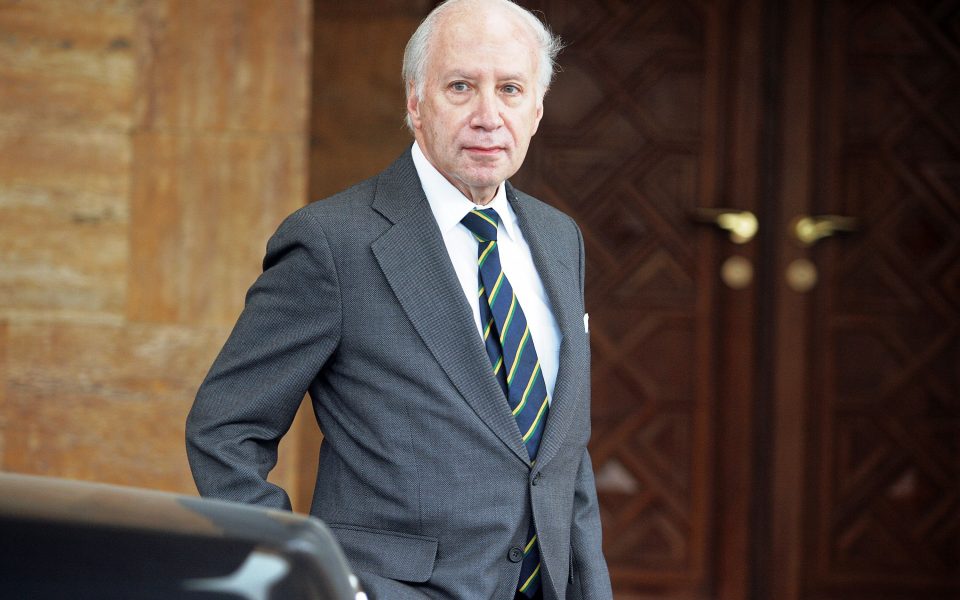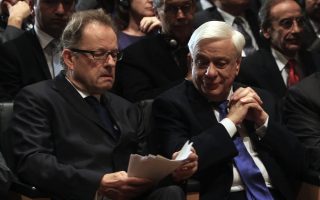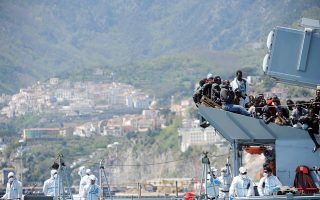Nimetz: It is time to resolve the name issue

United Nations mediator Matthew Nimetz believes it is time to resolve the dispute between Greece and the Former Yugoslav Republic of Macedonia (FYROM) over the latter's name. In a wide-ranging discussion with Kathimerini, Nimetz sets out his thoughts, hopes, but also his worries. He makes it clear that his choice is for there to be a composite name that would include a geographic qualifier. The envoy also talks about a “transitional period” and notes the need for a fast-track process for Skopje to join NATO and the European Union.
During his time in the role, Nimetz has met many leaders and foreign ministers from the two countries. He has listened at length to the positions and arguments of both sides, and has put forward a range of compromise solutions to the name dispute.
Over the last couple of decades, Nimetz has told me on many occasions about the times that he was close to a solution but was unable to clinch one. He has never hidden his disappointment about this. Now, due to the turmoil caused by the refugee crisis and the fears about terrorism spreading, he believes there are pressing reasons for a solution to be found as soon as possible.
Where are we on the name issue?
It is 20 years since the signing of the Interim Agreement and I think I am the only one who sat at the table when it was signed who is still working on the matter. Clearly it is time to resolve it. The migrant issue that so affects the two countries involved in the “name” dispute, the rise of terrorist threats in the region, and the troubling economic issues facing Southeast Europe today are new reasons why settling this issue is vitally important. A settlement would open the door to better cooperation and a stronger Euro-Atlantic approach to dealing with regional issues and would serve the interests of both countries.
Are you optimistic it will be solved soon?
During the past year or so the “name” issue has been lower on the priority list, as both nations involved have faced other important issues. I cannot fault them for this, but I believe it is time to focus with greater intensity on this issue with the goal of resolving it. Let me say I definitely believe it is resolvable, but more than that, it is resolvable in a way that will be positive for both countries. This is not a situation which is what we call a “zero-sum” situation: where one party “wins” and the other “loses.” There can be a resolution that is a “win” for both countries, meeting the national goals that each believes important. What is needed is to put this matter on a fast track and engage the leaders of both countries to solve it. The United Nations process, and the support of friendly parties, can be very important in this process.
Would you opt for the use of the term Macedonia but with a geographic qualifier?
The main building blocks of a solution are, to me, clear, because, after all, we have been talking about this for 20 years. The precise elements of an agreement have to be worked out by the parties, but I will tell you what I think they should consist of. First, there needs to be agreement on a name for the state that includes Macedonia but includes a suitable modifier, in my opinion a geographic modifier would be best, that preserves the dignity of the state but also differentiates it from the large part of Macedonia that is an integral part of Greece.
What about the use of the name and other important elements?
Well, this is the second element. There must be agreement on subsidiary aspects of the name, such as scope of usage and transition period, that I believe can be solved by serious discussions between the two sides with good will. Third, there must be assurances that the issue of any territorial aspirations are forever rejected and that a peaceful and cooperative relationship be the basis for the relationship. Fourth, the identity of the respective people must be respected by whatever agreement is reached. Fifth, the cultural heritage and patrimony of the respective people must also be respected. Sixth, a fast track for admittance to NATO is essential as well as support for setting firm dates for a start to the process of EU entry, which would of course be under the supervision of the European Commission.
What should be the next moves?
The most important thing in my opinion is to put solving this “name” issue very high on the agenda in both Athens and Skopje. The dialogue between the two foreign ministers has, from what I can tell, been a constructive one and my hope is that this will continue. The visit of Foreign Minister [Nikos] Kotzias to Skopje some months back was an important step in the process of building trust, as was the agreement on a series of confidence-building measures. These confidence-building measures, CBMs as they are called, were a good initiative from Athens and the positive way the concept was received in Skopje also reflects a positive atmosphere, but now we must build upon that important step forward in the relationship.
Would it help if the two prime ministers met bilaterally?
At some point, sooner rather than later, a meeting of the two prime ministers would be valuable. Having watched how they handle their roles as leaders and negotiators, and having now met them both at the United Nations General Assembly (UNGA), I believe they are two leaders who know this issue and who definitely know how to negotiate. I think they both have the trust of their country that they will protect the national interests of each, and that they have the strategic vision and political courage to work out a solution.
What is the United Nations' role at this stage?
The United Nations secretary-general is charged with helping the parties to solve this problem, both through Security Council resolutions but also as a responsibility set out in the Interim Agreement which specifically endorses the UN process. The UN Security Council determined the temporary reference “the Former Yugoslav Republic of Macedonia,” which was meant as a temporary measure pending a decision on the permanent name, and the Security Council will be required to act to change this temporary reference. So the United Nations is very much involved, and I should say eager to see a solution to this issue.
What has Secretary-General Ban Ki-moon's role in the issue personally been?
Secretary-General Ban Ki-moon knows this issue well and has urged me to help resolve it during the 15 months he has left in his term as secretary-general. I take this responsibility seriously, and to be honest with you I feel a bit disappointed in myself for not having done more to solve this problem.
How does the US see the isue?
Of course you understand that I do not speak for the United States at this point in my career, only for the United Nations. However, I think I can say that the United States has a strong interest in the resolution of this issue. The US has a consistent policy of supporting the well-being of Greece as an ally and friend, and helping Greece to resolve issues in a way that is positive in promoting the friendship between the two countries and the position of Greece as a major contributor to peace and security in the region. The US is also very much concerned about stability and harmony in all of Southeast Europe, particularly in these troubled times; therefore the US has, since the breakup of Yugoslavia, been supportive of the Former Yugoslav Republic of Macedonia in terms of encouraging its democratic institutions and processes, its economic development and its security and stability and integrity as a newly formed nation. In this connection the United States has put a high priority on its integration into the broader Euro-Atlantic framework, particularly entry into NATO and admission into the EU in accordance with their rules and processes. Given this broad approach of the United States, the solution to the “name” issue is, I believe, an important priority; I can say with confidence that as the UN representative I have been given full support and much encouragement from Washington.
Are you planning a new visit to the area soon?
I have not visited the region for more than a year now, mainly because so many other issues of supreme urgency have been dominating the political agenda in the region. However, I have been talking to both sides during this period and recently suggested that I come to the region to discuss these issues directly, and hopefully at some time soon a visit will be arranged.
What was discussed between the secretary-general and prime ministers Alexis Tsipras and Nikola Gruevski during the recent UNGA?
I attended the meetings of both prime ministers with the secretary-general, and the “name” issue was high on the agenda in both meetings. It is not for me to say what was said with specificity, but both prime ministers set forth their views strongly but respectfully.
How do you assess the new Greek prime minister?
This UNGA meeting was my first time seeing Prime Minister Tsipras in person (although I’ve watched him on television many times) and I was impressed with how he framed his positions in speaking to the secretary-general on a number of issues, including the migrant problem, economic issues, Cyprus and of course the “name” issue. Although Prime Minster Tsipras has been in office only a relatively short time, my sense is that his experience has been so intense that each month should probably count as a year in terms of experience.
And your view of Prime Minister Gruevski?
Prime Minister Gruevski of course I have seen in action over many years. In person he is very serious and focused, and is an intelligent and thoughtful interlocutor. He is a strong personality and an effective and experienced leader and of course knows this issue in all its manifestations.
How serious is the refugee issue in the area, and how should it be dealt with?
As a human being and citizen I am very concerned about the migrant issue that is directly affecting the Mediterranean and Balkan region so dramatically, but also I have some experience in this. When I served in the US State Department in the late 1970s, for a period I was acting coordinator of refugee affairs during the period when tens of thousands of Vietnamese and others were fleeing in the aftermath of the Vietnam War. The United States took the lead in organizing a worldwide effort, endorsed by the United Nations, including use of the US Navy, establishment of temporary camps in the immediate neighborhood, relief efforts, a process of interviewing the refugees and then long-term settlement arrangements. The United States accepted over 800,000 refugees during this period, and these refugees and their descendants have turned out to be wonderful citizens and contributors to our country.
What should be done in the current situation of refugee flows to Europe?
Of course the present situation in your region is very different in many respects, but I believe it too requires a broad effort by the world community. I think putting such a disproportionate burden on the countries of first arrival and transit is unrealistic and unfair. We are dealing with a long-term phenomenon that has a humanitarian aspect but also a political and strategic dimension.





